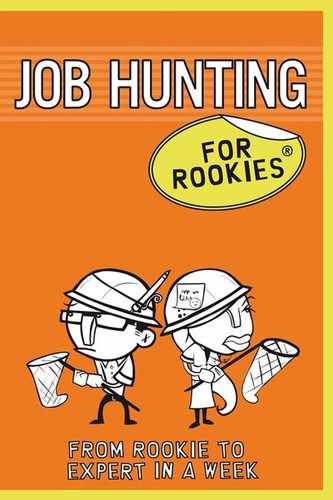CHAPTER 10
Closing the deal
Ensuring you have glowing references
Employers usually make job offers subject to “satisfactory” references – in other words, checking that your current or previous employers don’t say anything too bad about you. Of course you’d be devastated to be offered a job only to lose it because your references aren’t good enough. So make sure you choose your referees (the people who write your references) carefully.
Keeping references off your CV
For a start, don’t include details of your references on your CV – it takes up space and you definitely don’t want possible future employers to contact your referees until you have been made a firm offer.
You don’t even need to include the phrase “References available on request” on your CV: it adds nothing. Employers will ask for references if they want them. In fact, including the phrase may even detract from your CV because it is such an obvious statement that you may come across as a bit of a novice or even an idiot!
Choosing the right referee
Amazingly, some job hunters ask former bosses or colleagues to write references for them without checking that those references will help them to get the job. To ensure that you have positive references, always speak to potential referees. Ask them whether they would be happy to give you an unreservedly positive reference.
If a potential referee sounds at all hesitant or reluctant to be totally positive about you, you should politely enquire as to any concerns. Only if you are 100 per cent certain that a referee is willing to speak well of you should you accept them as a referee.
 Rookie Buster
Rookie Buster
To ensure that you have positive references, always speak to potential referees.
Highlighting your strengths to a referee
A great way to ensure that your reference will be consistent with what you have said about yourself in an interview is to write a letter to your referee. Remind each referee of the particular skills, qualities or experience that you would like to have included in your reference.
Consider the following example:
Dear Jeremy,
Thank you for agreeing to write a reference on me. As I mentioned on the telephone, I’m applying for a job as a publishing assistant at a variety of magazine companies.
I’d really appreciate it if you could emphasize certain qualities from when I worked in your team:
• My research skills – for example the work you asked me to do in preparing for your client meetings with Oceanfresh Seafood and Olympus TV Productions.
• My dedication to the team – for example, that I was usually one of the last to leave the office. Remember that time when you told me to go home because you thought I was working too hard! Also that I did not take one sick day and that I was always on time in the mornings too.
• My attention to detail such as when entering our weekly budget data into the spreadsheet for accounts.
I’ll give you a call in the next few days to see if you have any questions.
Thanks again for agreeing to be a referee in the meantime.
Best regards,
Hilary
Following up with a note
Here’s a tip that will boost your chances of getting the job – and it’ll take just five minutes. Be sure to write a short thank-you letter to interviewers.
You may consider this an old-fashioned practice. But this is precisely why you should write a letter to interviewers. So few candidates write follow-up letters that you are more likely to make an impact. You will stand out by taking those extra few minutes to show that you really want the job. Given that you’ve invested hours in researching the job and going along to the interview, doesn’t it make sense to spend just another five minutes giving yourself the best chance possible of landing the job?

Some pointers on targeting your letter:
• Send either an email or a letter in the post. However, many interviewers may not give you their email addresses – in which case a letter will have to do.
• Keep your letter brief – be sure it is no more than a page in length.
• Send your letter on the same day as you had the interview. Carry some letter paper, envelopes and stamps with you so that you can hand-write your letter and post it on the same day.
 Rookie Buster
Rookie Buster
So few candidates write follow-up letters that you are more likely to make an impact.
In your thank-you note, be sure to express the following points:
• That you enjoyed meeting the interviewers and hearing about the team/department/organization’s plans.
• That you now want the job even more than you did before you went into the interview, based on what you heard about the job and the organization.
• That you have the perfect skills and experience for the role. Be sure to mention one of the main benefits that you could bring to the role.
Dealing with disappointment
Even the very best candidates get rejected occasionally. You may be an excellent candidate. But perhaps another candidate was just better on the day, or had more experience or better qualifications. You can’t always control the outcome of an interview. However, you can control how you respond.
As soon after the interview as possible, be sure to review your performance during the interview by answering the following questions:
• What went well during the interview? What were you pleased with that you should repeat in future interviews?
• How do you think you used your body language and tone of voice during the interview? What could you do differently in your next interview to communicate your enthusiasm and personality?
• Was your appearance and style of dressing appropriate for the interview? What would you change for future interviews?
• What questions (if any) caused you difficulties or problems? How would you answer them next time?
• Did you do the right amount of research? Or should you do more next time?
• What else could you do to improve your interview performance the next time around?
Review how you did every time and you can ensure that you will learn, grow, get better and ultimately get a great job.
 Rookie Buster
Rookie Buster
Review how you did every time and you can ensure that you will learn, grow, get better and ultimately get a great job.
Trouble-shooting specific situations
The advice in this book will help you to overhaul your job hunting prospects. Occasionally though, job hunters will get stuck with a particular problem. Here’s some guidance on three common situations.
“I’m getting interviews but not job offers”
Some job hunters go along to interviews but can’t seem to convert their interviews into job offers. If that’s the case for you, start by checking that you are doing enough basic research on employers before you turn up for the interview (see “Researching employers” in Chapter 2). Are you comfortable that you know enough about the employer to be able to answer questions such as why you want the job or why you want to work for that particular organization?
Another common issue is that you may be focusing a lot of your effort on what you say, and not enough on how you say it. You can do all the thinking you like on what to say, but you will gain so much more by practising your interview responses out loud.
And the best way to practise out loud is by asking friends to run through mock interviews with you. You could either provide your friends with questions that you’ve been asked or ask your friends to come up with their own questions. And give them permission after the mock interview to tell you the truth. Exactly what do they think you need to change to improve your interview performance?
 Rookie Buster
Rookie Buster
You can do all the thinking you like on what to say, but you will gain so much more by practising your interview responses out loud.
“I’m not getting invited to interviews”
If you’re sending off your CV but not getting any interviews, consider these options:
• Ask for comments on the effectiveness of your CVs and covering letters. Ask friends or other people within your network if they know of people who actually interview candidates for a living (perhaps because they frequently hire people, or work in human resources or recruitment). Show those individuals your CV and the covering letters you have used for actual jobs. Ask for their advice. How could you make your applications stronger?
• Consider applying to different types of organization. If you don’t have quite the right experience or qualifications, you may be better off applying to smaller organizations. Large organizations often have rigid policies about the experience or qualifications they are looking for in candidates. Smaller companies – particularly those with only dozens as opposed to hundreds of employees – are often more flexible with their requirements. Smaller organizations tend to be more interested in finding the right person for the job as opposed to worrying too much about the precise experience or qualifications you may have.
• Remember the importance of networking. Look back to Chapter 5 and remind yourself that up to 85 per cent of jobs (that’s nearly 9 in every 10) are filled by word of mouth. So ask yourself: are you spending 80 or 90 per cent of your time networking, speaking to acquaintances, gathering information on possible jobs and growing your network of contacts? If you’re not, then be sure to invest more of your time in networking rather than simply sending CVs and letters off to prospective employers.
 Rookie Buster
Rookie Buster
Are you spending 80 or 90 per cent of your time networking, speaking to acquaintances, gathering information on possible jobs and growing your network of contacts?
“I’m networking, but not getting recommended for jobs”
Many, many job hunters speak about the successes they have had in networking and asking for the support of friends and acquaintances in looking for a new job. The sheer volume of candidates who have found new jobs through networking proves that it works.
But if your networking efforts have yet to pay off, consider the following:
• Are you managing your personal impact? Remember that you must stay upbeat and professional in all of your dealings with people when networking. No matter how desperate or despondent you may occasionally feel, you must ensure that the people you meet see you at your best at all times. If you’re unsure how you come across when networking, arrange with a friend to run through a mock networking scenario and ask for candid feedback on how you came across.

• Are you gaining enough referrals? Remember also that you must take the initiative and ask for the names of further people that you could contact. The purpose of networking is only partly to gather information and advice; a large part of networking is to do with expanding your network. So be certain to ask (politely) for names of other people who could help.
• Are you putting in enough effort and retaining the initiative? Bear in mind that people are busy and may forget to return your calls or get in touch with you. You must stay in control – it is your responsibility to call people back, write thank-you notes, email them and remind them that you exist!
 Rookie Buster
Rookie Buster
No matter how desperate or despondent you may occasionally feel, you must ensure that the people you meet see you at your best at all times.
Signing on the dotted line
With a little work, you will soon be getting job offers. To ensure that you make a smooth transition into a perfect job, work through the following steps:
1. Wait until you have been made a verbal offer before raising the issue of pay and benefits. The best time to negotiate is when there is no doubt that the employer wants to hire you – but doesn’t yet have you. Be polite and calm in all of your negotiations, but remember that if you don’t ask, you won’t get!
2. Be sure to see the offer in writing. You don’t want to quit your old job until your new employer has made a firm offer to you in writing.
3. Evaluate carefully the written offer. Is the salary and benefits package exactly what had been discussed? Are you getting the holiday entitlement that you had expected? Check that you are happy with all of the details before signing on the dotted line.
4. Celebrate! Congratulate yourself on your new job!
 Rookie Buster
Rookie Buster
The best time to negotiate is when there is no doubt that the employer wants to hire you – but doesn’t yet have you.
Coach’s notes 
• Be sure to ask potential referees if they would be willing to provide you with wholly positive endorsements; and write them a briefing letter to ensure that they tell employers what you want them to say.
• Follow up every interview by writing a short note to the interviewers. Just five minutes of additional work could make the crucial difference to securing that job!
• Realize that not even the most talented candidates get offered a job every time. To help you improve every time, be sure to quiz yourself to see what you could learn from interview rejections.
• If you are struggling to find a job, remember that networking and using word of mouth referrals is possibly the most successful route to finding a new job.
• Bear in mind that the best time to negotiate a better deal is once an employer has made you an offer. Ask (politely) for more and you may just get it!
Go for it! I’ve been interviewing candidates and training interviewers for years. You now have all of the tools you need to get out there and find yourself a great new job. So what are you waiting for? Go do it. Get a new, better, more fulfilling job. Good luck!

Notes |
